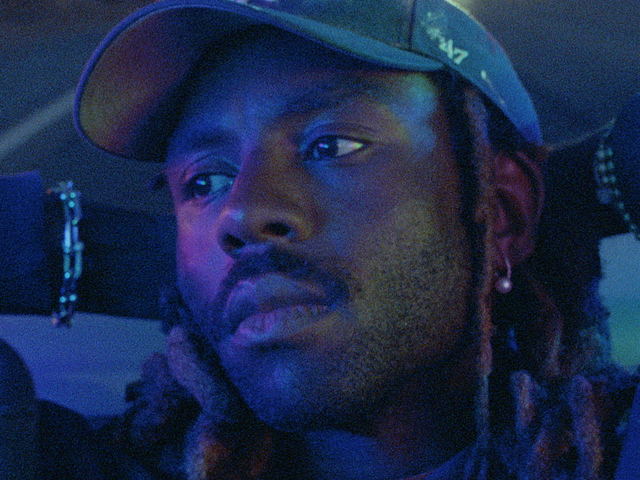Asking Marisa Dabice if there's anything she'd like to get off her chest is like tossing a full gas can into a volcano — a slow and deliberate explosion bright beneath the surface.
She's admittedly upset about a lot of things a lot of the time, but right now the Mannequin Pussy frontwoman is particularly fatigued by politics, primary processes, and an entire generation that has refused to relinquish its power. She refers to the whole thing as a "patient waiting game," one in which we collectively wait for boomers to either "die, give up, or change their minds."
"I've always been a real believer that if you can change the way that someone feels about something, then you can change their mind," she says. "But, you know, things take time."
Dabice has yet another grievance: Musically, she feels we've been living in a "whisper rock era" that, according to her, breeds an "angst that can easily be put on a Spotify playlist."
"It's still easy listening that maybe you're not even really paying attention to," she says. "And I don't think that human emotions are made for easy listening. Obviously, we're not letting any shit die on our watch — like, we're still doing what we're doing. But I think, unfortunately, we've gotten to a place where we really do [measure] the worthiness of someone's art by how commercially successful it is."
Meanwhile, Mannequin Pussy is not easy listening. Dabice recalls someone once describing her Philadelphia-based band as a "hard sell," and she doesn't totally disagree. In 2014, Mannequin Pussy made its debut with Gypsy Pervert, a rapid, seizing, and tornadic 10-song, 17-minute record that established Dabice's unique glossary of twisted terms of endearment. "You're my kind of scumbag," she professes on "Meatslave 2."
But the band as a hard sell might have less to do with the actual music than it does about the band's name. Dabice says she and her bandmates had no real intention when they assembled, aside from striving to make music as loud and ferocious as they possibly could. As with so many bands, it was simply an outlet. But according to Dabice, the band slowly started to morph into something else: something "real and meaningful" that just so happened to have adopted a name that describes the innocuous glossy genitalia of an inanimate woman using what some might consider a controversial word that got a lot of play on major news outlets leading up to the 2016 presidential election, when leaked footage surfaced of Donald Trump telling entertainment pundit Billy Bush that his "star" status allowed him to get away with anything, including grabbing women "by the pussy." Knowing what she knows now about the band's trajectory, she wonders if the name has made it hard for them to reach a wider audience.
"I think our band name really does turn off enough people that might actually really like us if they gave us an opportunity," she says. "It's weird because I think as your ambitions and goals change, that's the only time I start to regret things. Like, will we ever be able to be played on the radio? Will we ever be invited to like a late-night television show, or have we created barriers for ourselves?" she asks. "I don't know."
Last year, Dabice, along with drummer Kaleen Reading, guitarist Athanasios Paul, and bassist Colins Rey Regisford, released Patience, Mannequin Pussy's third record and one of the most unflinching records of 2019 — and perhaps the antidote to the whole "whisper rock" thing.
Just as Courtney Love made her bed and died in it on Hole's "Miss World," Dabice wails outside the gates of her own hell, as she does on "Cream." Where Beyonce was "Drunk in Love," grinding on her metaphorical surfboard, the Mannequin Pussy vocalist is drinking and dialing on "Drunk II," where she details being too wasted to remember that she was broken up, declaring, "I still love you, you stupid fuck."
"When you hit me/ It does not feel like a kiss/ Like the singers promised/ A lie that was written for them," Dabice sings on "Fear/+/Desire" in reference to the 1962 single "He Hit Me (And It Felt Like a Kiss)" written for the Crystals by Carole King and produced by Phil Spector who, in 2009, was found guilty of murdering actress Lana Clarkson. And on "High Horse" she describes the sensation of being able to taste someone else's breath on her teeth while pushed against the kitchen sink.
Dabice has said that love is her muse and suggests it might have something to do with her astrological chart. She's a Virgo-Libra cusp with Venus in Libra and a Leo moon, which might explain why she falls in love so quickly and why she craves attention and adoration, all qualities which can be gleaned from her chart, sure. But Mannequin Pussy is a bit more complex than the involuntary cosmic push and pull. Dabice's lyrics are nothing if not a parade of trauma, heartbreak, and losing what you love most, even if that love was fleeting.
"This really magical thing that happens and you don't want to lose it," she says of love. "But then you do. And you often, you know, you lose people that should be lost. I think that's, like, one of the biggest lessons in growing up is that heartbreak is just a symptom of truth," she says. "I wish I would have figured that out earlier."
Dabice often questions why people make music, but not in a holier-than-thou kind of way — more as a self-reflective anthropological study. She says it's an important thing to ask yourself, especially as a musician.
"Why do you want to create this, and are you trying to connect to people? Are you trying to create something new, or are there vapid intentions behind it? I think that's kind of what killed rock music for a while was that there was just, like, really vapid, insincere bullshit taking up space that could be so easily occupied by something maybe more worthy of that space," she says. "But I also don't want to be the kind of person who's like, this is worthy and this isn't, but yeah, I don't feel anything when I hear an Imagine Dragons song on the fucking radio."
For Dabice, she knows why she makes music. When Dabice was 15, she was diagnosed with cancer, and at 23 she cared for her mother after she'd suffered a stroke. Though she confesses to having partied and gotten into trouble like kids do, she admits that her experience was isolating. On top of being a teenager growing up in the Connecticut suburbs, Dabice was all too aware that her peers were not dealing with the things she was dealing with and says she didn't get the chance to be a kid, at least not in the way the movies portrayed teenageerdom. She's folded that experience into her music, though perhaps only as an overarching philosophy.
"Within the experiences that I had, people can connect to the emotions that are attached to them, even if they can't connect to the experience itself," she says.
She also thinks we should scream more. Like really scream. Not just for catharsis, but as protest.
"It's impossible to find a safe space to scream, which I think there's so many movie scenes where the lead character is breaking down and, like, they're in their car alone and they're just screaming at the top of their lungs. And I was thinking about that a little bit. How Patience is like me sitting in my car screaming, just on record and to melody and song," she says. "But it's not really socially acceptable to express rage like that because I think, one, it's seen as being unattractive, which is, I think, the cardinal sin of being a woman is to be unattractive. Two, it's scary, which I think is the second cardinal sin of being a woman is to be scary or unapproachable. And then third, once you realize that maybe those things don't matter, you're able to create your own spaces where those things are acceptable."
Mannequin Pussy has been busy. The group has been on and off the road since September of last year, just after the release of Patience, which is why they haven't had time to write or record or flesh out their fourth record. But Dabice says they're already experimenting with creating music that sounds like an emotion rather than telling the audience through lyrics what that emotion is, and they're approaching the new material with questions like, "How do we make a song that feels like pure energy? Or a song that instrumentally feels like sadness?"
Though Dabice is on solid ground, she says there's always unfinished business when it comes to her art, and that healing, growth, and self-confrontation are full-time, lifelong works in progress. She is in no way concerned about her creative well running dry.
"I don't know how much more trauma I can excavate for my art," she says. "I think it's always an ongoing process. I think that, like, PTSD stuff is something that still really affects me in my life, and I try to calm myself down in times where I'm reminded of certain experiences. I think, unfortunately, our healing processes are usually kind of lifelong. Like right now, I feel very solid emotionally in my life for the first time in very long. And I think I have this record to thank for that. But I think for as long as there are things out there that upset us and make us angry and cause grief, there will always be something to write about. I'm not worried about not having anything left."
Mannequin Pussy will open for Best Coast at 7 p.m. on Friday, March 13 at El Club; 4114 W. Vernor Hwy., Detroit; 313-279-7382, elclubdetroit.com. Tickets are $28-$30.
We have a new events newsletter! Find out the best things to do in the area every Thursday morning in your inbox.






